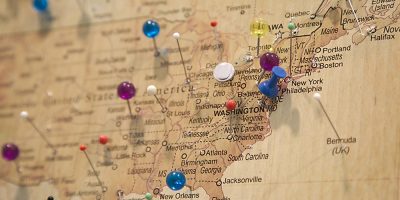Vax Passports: Where Your State Stands

All Global Research articles can be read in 51 languages by activating the “Translate Website” drop down menu on the top banner of our home page (Desktop version).
Visit and follow us on Instagram at @crg_globalresearch.
***
A lay of the land on what states are doing—or not doing—to protect freedom of choice. Action Alert!
As more Americans get vaccinated against COVID-19, and vaccination recommendations extend to younger and younger Americans, we are starting to see more efforts to require vaccination as a condition of receiving services, as we’ve seen at American universities. This endangers autoimmune patients who are more at risk of serious adverse events following COVID vaccination. States can take a stand for medical freedom and privacy rights. To prevent de facto vaccine mandates that endanger millions of patients, we must encourage state leaders to take action to protect our health.
Ten states, so far, have taken steps to restrict or ban the use of vaccine passports, electronic applications that display an individual’s vaccination status or COVID lab test results. Many have done so through executive orders signed by the governor: Arizona, Florida, Texas, South Carolina, South Dakota, Montana, and Idaho. Three states have passed legislation along similar lines, including Utah, Indiana, and Arkansas.
These policies have important differences. In Florida and Montana, executive orders prevent businesses, in addition to state institutions, from requiring patrons to provide proof of vaccination to gain entry or service from the business. In Idaho, Arizona, South Dakota, Utah, South Carolina, Arkansas, Indiana, and Texas, the ban on vaccine passports is generally limited to entities of the state government or (in the case of Texas) any business that receives state funds.
Legislation is pending in the following states to prevent discrimination based on vaccination status and/or to prevent the use of vaccine passports: FL, NC, OK, HI, OR, RI, TX, WI, PA, and VT.
Texas State Senator Bob Hall, one of the sponsors of a bill preventing discrimination in Texas, had eloquent words to share about vaccine passports: “[My bill] aims to give Texans the peace of mind of knowing that their ability to navigate, participate, and function without being required to undergo an experimental medical procedure as a condition of that engagement is protected by law.”
Some governors have made positive statements, though have not yet taken action to prevent vaccine passports. Georgia Governor Brian Kemp tweeted, “I do not and will not support any kind of state-mandated vaccine passport…the decision to receive the vaccine should be left up to each individual.” Governor Pete Ricketts of Nebraska said “Nebraska will not participate in any vaccine passport program. This concept violates two central tenets of the American system: freedom of movement and healthcare privacy.” Tennessee Governor Bill Lee announced “I oppose vaccine passports. The COVID-19 vaccine should be a personal health choice, not a government requirement.”
Some states are moving in the other direction. Hawaii is allowing fully vaccinated Hawaiians to travel between islands without quarantine and other testing rules, with plans in the works to launch a vaccine passport system. New York has already launched the Excelsior Pass, a voluntary app that allows people to upload negative COVID-19 test results or proof of vaccination. Governor Ned Lamont of Connecticut said he expects “some type of passport or validation … probably led by the private sector,” and that more planning will occur once vaccinations are open to everyone. Governor Roy Cooper of North Carolina said his administration is exploring the development of vaccine passports.
We’re already seeing how this can play out. In Israel, for example, the government issues “green passes” allowing access to social, cultural, sporting events, gyms, restaurants, etc., to individuals who have either recovered from COVID or have had the vaccine. Green passes must be renewed every six months.
We are all eager for life to return to “normal” following extended lockdowns and isolation. But vaccine passports are not the answer. We cannot deny rights and privileges to those, such as autoimmune patients, who choose not to receive a medical procedure due to a legitimate medical concern.
Action Alerts!
- Florida and Montana residents, thank your legislators for banning vaccine passports. Take Action!
- If you live in a state that banned vaccine passports only in state institutions (AZ, AR, ID, IN, SC, SD, TX, and UT), thank lawmakers for taking action but urge them to extend the ban on passports to businesses in the state. Take Action!
- All other states: urge your lawmakers to take action to ban vaccine passports in your state. Take Action!
*
Note to readers: Please click the share buttons above or below. Follow us on Instagram, @crg_globalresearch. Forward this article to your email lists. Crosspost on your blog site, internet forums. etc.
Featured image is from Alliance for Natural Health

